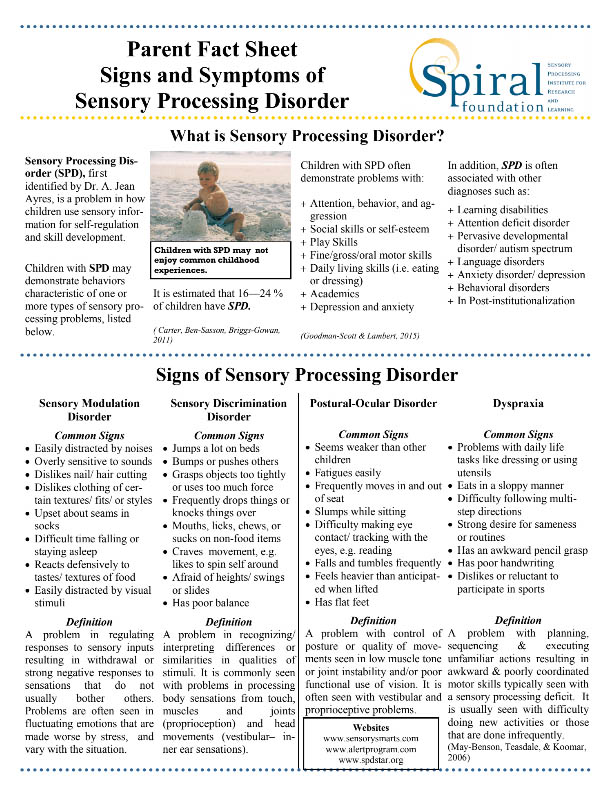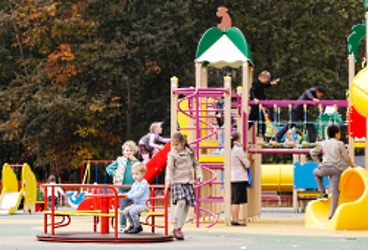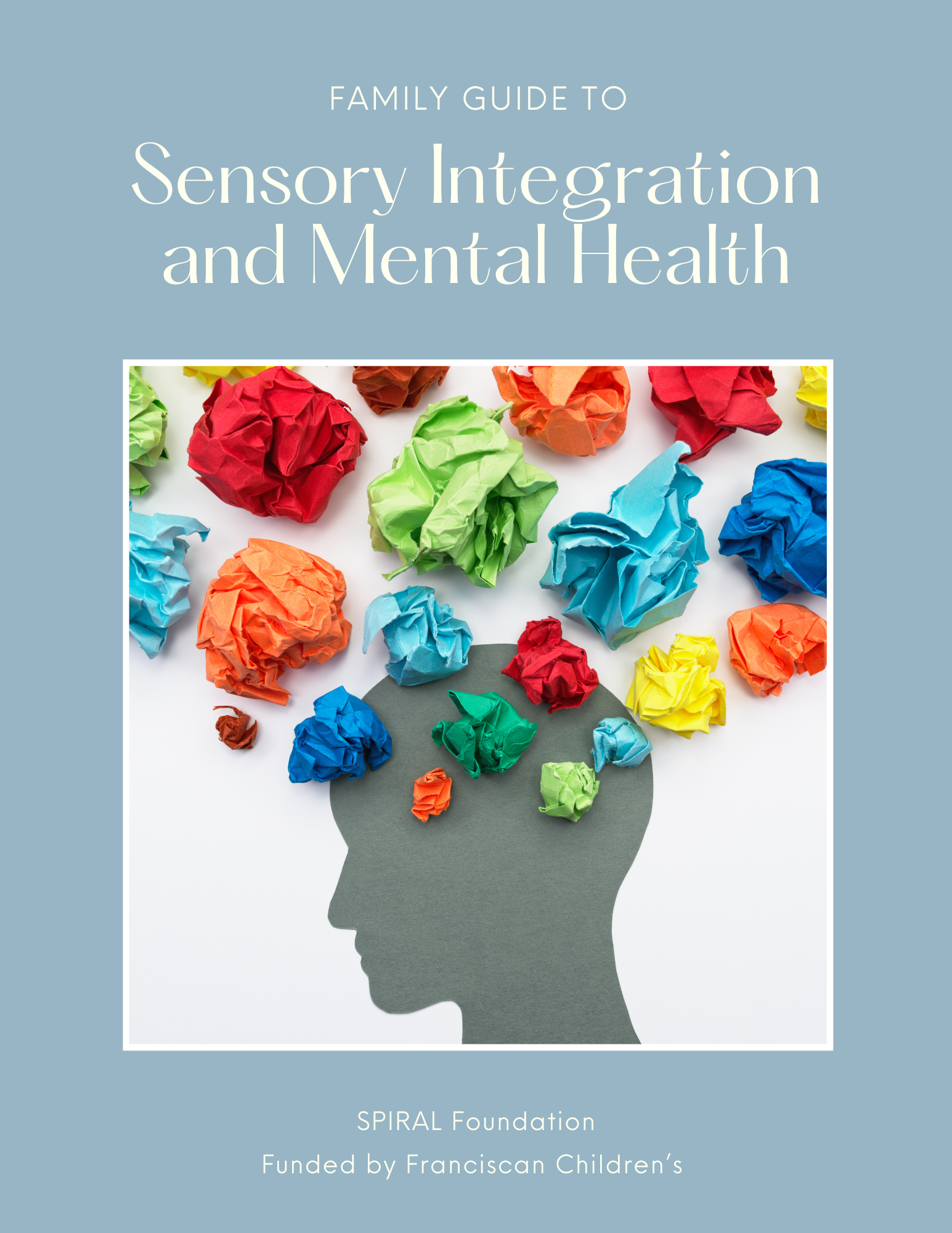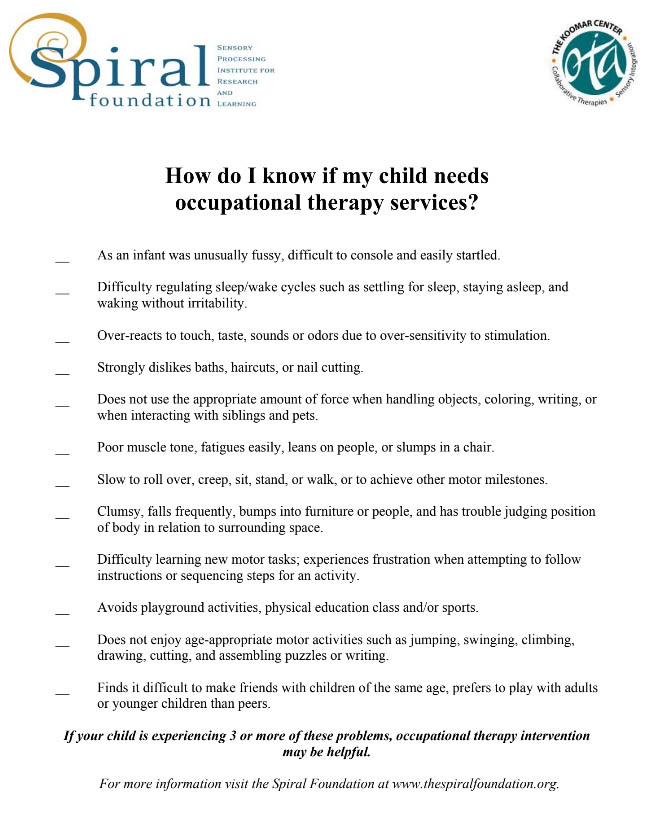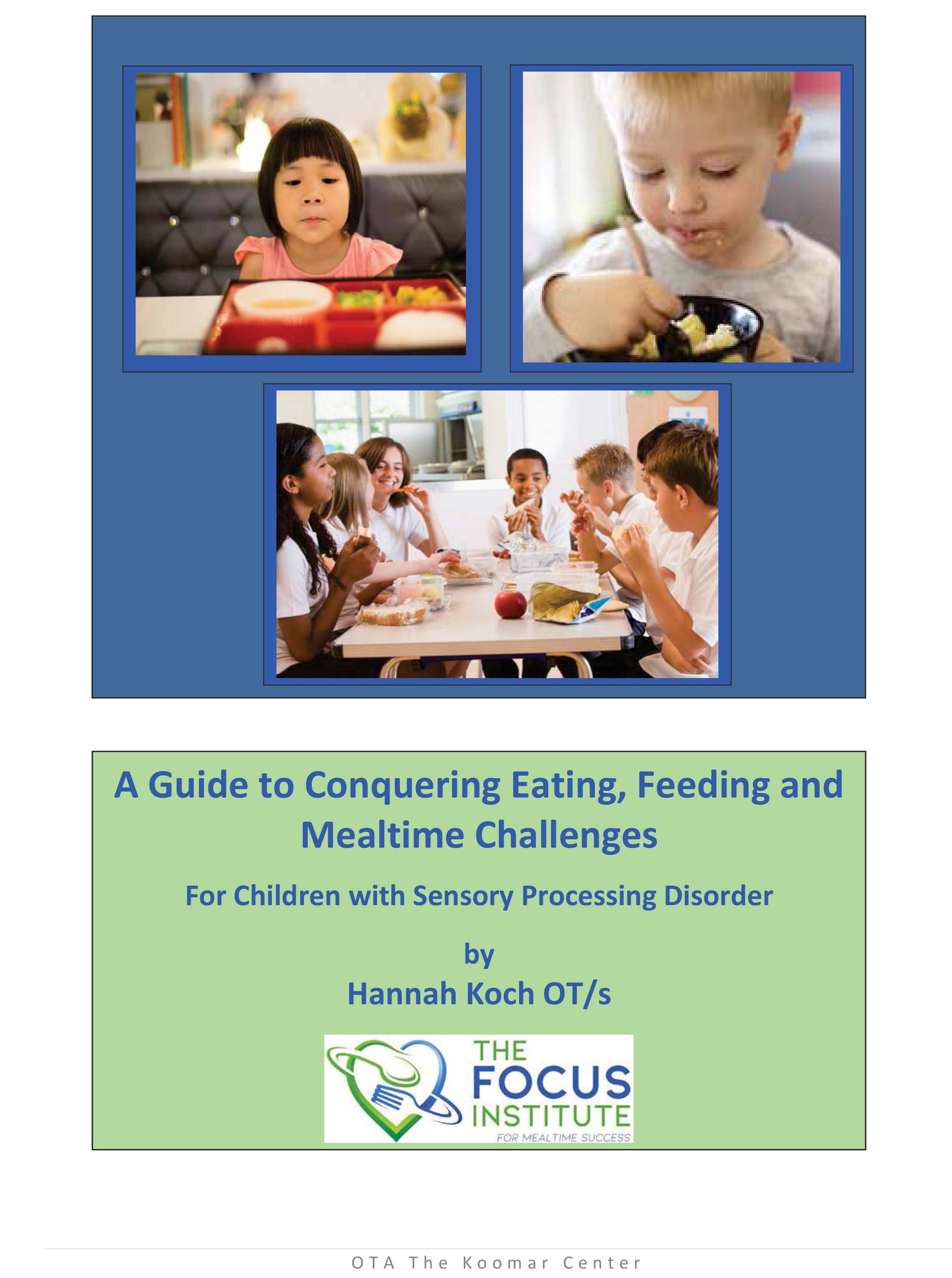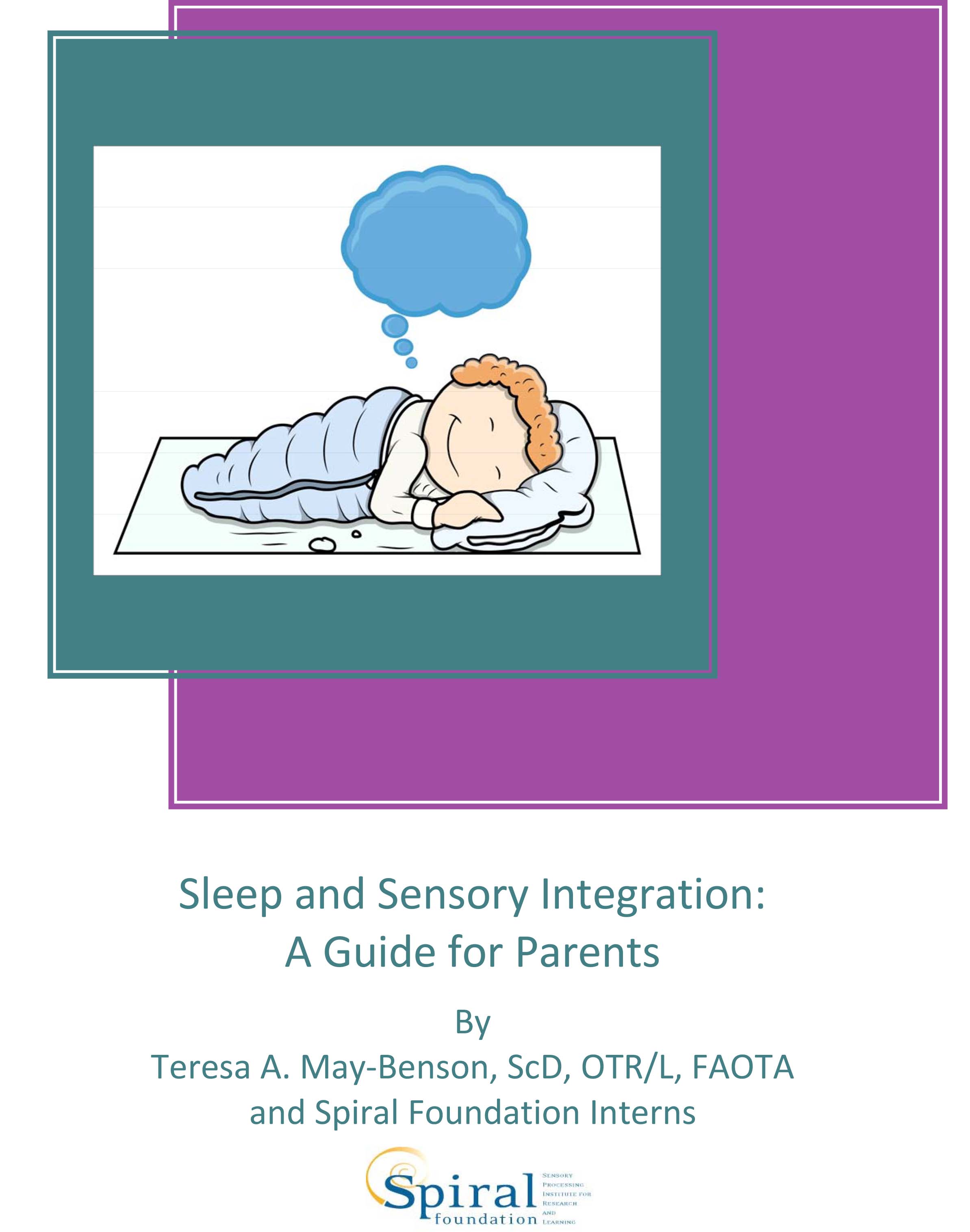SPD Education Toolkit
For Parents and Caregivers
This toolkit, is a collection of free resources related to the understanding, identification, and intervention of Sensory Processing Disorder (SPD) and related diagnoses, designed to help parents and other non-professionals better understand sensory processing difficulties and in turn, better support, and advocate for their loved ones. All resources on this page are provided under a Creative Commons license and may be copied and distributed with attribution for noncommercial use. Supported by grants from the John W. Alden Trust and the Maxwell Hurston Charitable Foundation,
![]() This work is licensed under an Attribution-NonCommercial-NoDerivs 3.0 Unported License.
This work is licensed under an Attribution-NonCommercial-NoDerivs 3.0 Unported License.
Introduction to Sensory Integration
“A Guide to Sensory Integration for Parents” is a free, downloadable handbook for caregivers whose child has recently been diagnosed with Sensory Processing Disorder (SPD) or who suspect their child may have sensory related difficulties. This handbook includes a brief introduction to the history of sensory integration, descriptions of common signs and symptoms, an overview of different types of interventions, and more.
Download a “Guide to Sensory Integration for Parents”
![]() Download English (PDF) Updated 2021
Download English (PDF) Updated 2021
![]() Download Portuguese (PDF)
Download Portuguese (PDF)
![]() Download Turkish (PDF)
Download Turkish (PDF)
Introduction to Sensory Integration
This 20-minute PowerPoint presentation, provides an introduction to Sensory Integration, Sensory Processing and Sensory Processing Disorder (SPD), including an introduction to the concept of sensory diets and supportive sensory strategies. This presentation may be effectively used to introduce teachers to SPD or may be an appropriate presentation for a parent advocacy group. The presentation is available as a video with voice over narration, and PDF handouts and as an audio only podcast.
Sensory Processing Disorder – In Their Own Words
This three minute video, part of the longer When Our Senses Don’t Make Sense, features several short interviews with therapists, caregivers, and clients. It offers a brief but poignant glimpse into the world of sensory integration and Sensory Processing Disorder.
Introdução a Integração sensorial
Este webinar tem por objetivo abordar a Integração Sensorial, proporcionando à audiência um conhecimento básico sobre a história da Integração Sensorial, sobre os transtornos relacionados, como identificar estes transtornos em suas crianças e se familiarizar com a terapia ocupacional como forma de tratamento para os devidos transtornos.
![]() Download (ZIP)
Download (ZIP)
Transtornos de processamento sensorial e intervenções baseadas em integração sensorial
Este webinar tem por objetivo abordar as formas de tratamento para transtornos de processamento sensorial, aprender sobre esta intervenção em integração sensorial e a importância da terapia ocupacional nesta e conhecer a função de alguns equipamentos utilizados na realização desta intervenção.
![]() Download (ZIP)
Download (ZIP)
Resources
These fact sheets, developed by the SPIRAL Foundation, detail some of the most common signs and symptoms of Sensory Processing Disorder to be recognized by parents and caregivers, educators, and physicians.
They include definitions of different types of sensory dysfunctions dysfunction and related symptoms, brief sections on research and statistics related to Sensory Processing Disorder, and reference and resource lists.
![]() Download Parent Fact Sheet (PDF)
Download Parent Fact Sheet (PDF)
![]() Download Educator Fact Sheet (PDF)
Download Educator Fact Sheet (PDF)
![]() Download Physician Fact Sheet (PDF)
Download Physician Fact Sheet (PDF)
Sensory Friendly Clothing List: Finding clothing that is acceptable for a child with tactile defensiveness can be a challenge. Each child and nervous system is different so what works well for one child may not work for another. This free resource provides a list of clothing brands that may be more acceptable to a sensitive nervous system to get the process started.
![]() Download Sensory Friendly Clothing List (PDF)
Download Sensory Friendly Clothing List (PDF)
Considerations for Selecting a Sensory Friendly Summer Camp: This free resource provides a list of factors to be considered when choosing a camp for your child. Additional profiles provide further assistance in identifying specific areas to consider for children with sensory defensiveness, sensory seeking or praxis differences, as well as suggestions on how to inquire about potential accommodations for your child as a camper.
![]() Download Considerations for Selecting a Sensory Friendly Summer Camp (PDF)
Download Considerations for Selecting a Sensory Friendly Summer Camp (PDF)
A Guide to Conquering Playgrounds for Parents and Teachers
Sensory processing impacts all areas of a child’s life, including play. This free booklet provides parents and teachers with strategies for helping children with sensory processing difficulties get the most out of their playground time.
![]() Download Guide (PDF)
Download Guide (PDF)

The Sensory Friendly Classroom
The classroom environment can be very challenging for children with sensory processing difficulties. This handout provides school personnel with recommendations that can be implemented into the classroom as a whole and offers suggestions for accommodating specific sensory needs.
![]() Download Guide (PDF)
Download Guide (PDF)
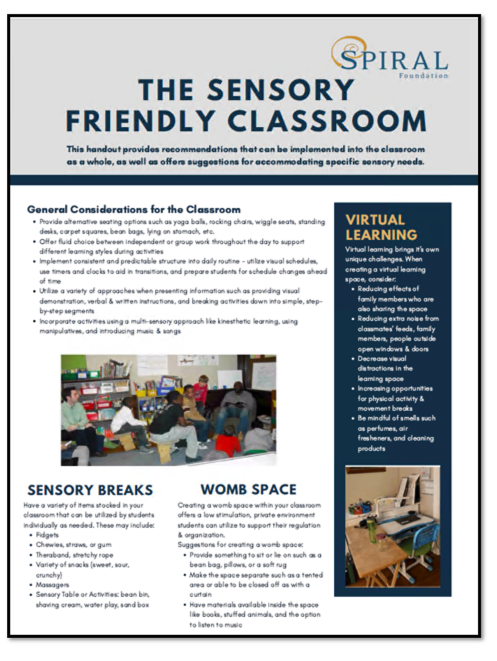
Family Guide to Sensory Integration and Mental Health
This guide was developed to help families understand
the connection between sensory integration and processing and
mental health. Through this guide, you will be introduced to
sensory integration, learn important sensory terms, start to
understand how difficulties in sensory integration and processing
can affect mental health, and ways to support your child.
![]() Download Guide (PDF)
Download Guide (PDF)
How Do I Know
Sensory Processing Disorder, and other sensory-related dysfunctions, can present in all sorts of different ways that vary by age and individual. These ‘How Do I Know?’ checklists are tailored to different age groups and offer a quick and easy way to determine if sensory integration-based therapies may be helpful for a child. They are not exhaustive and cannot, and should never, replace a proper evaluation, but they can be a good place for the concerned parent to start.
Download ‘How Do I Know’ Packet
![]() Download English Packet (ZIP)
Download English Packet (ZIP)
Includes checklists for: All Ages, Infants and Toddlers, Preschool, School Age
![]() Download German Packet (ZIP)
Download German Packet (ZIP)
Includes checklists for: All Ages, Infants and Toddlers, Preschool, School Age
![]() Download Portuguese Packet (ZIP)
Download Portuguese Packet (ZIP)
Includes checklists for: All Ages, Infants and Toddlers, Preschool, School Age
![]() Download Russian Packet (ZIP)
Download Russian Packet (ZIP)
Includes checklists for: Infants and Toddlers, Preschool, School Age
![]() Download Turkish Packet (ZIP)
Download Turkish Packet (ZIP)
Includes checklists for: All Ages, Infants and Toddlers, Preschool, School Age
Mealtime Success
The free Parent’s Guide to Mealtime Success provides information on underlying sensory and motor factors which may impact a child’s ability to eat and participate successfully in mealtimes. It provides strategies to support mealtime success and introduces the FOCUS Program for Mealtime Success intervention program.
![]() Download Guide (PDF)
Download Guide (PDF)
Sleep and Sensory Integration
Sleep challenges are one of the primary difficulties reported by parents of children with sensory processing problems. This free guide, Sleep and Sensory Integration: A Parent’s Guide, helps parents understand their child’s sleep and bedtime challenges and provides key tips for helping your child with SPD sleep better.
![]() Download Guide (PDF)
Download Guide (PDF)
Additional Reading
Sensory Integration and the Child: 25th Anniversary Edition (2005)
by A. Jean Ayres, PhD
A classic book by the ‘mother’ of sensory integration, updated and parent-friendly. It remains a valuable work on the subject, both practically and historically.
The Out-of-Sync Child (2006) and The Out-of-Sync Child Has Fun, Revised Edition: Activities for Kids with Sensory Processing Disorder (2006)
by Carol Kranowitz, MA
The Out-of-Sync Child provides and an in-depth exploration into sensory integration and sensory integration-related difficulties. It’s companion book, The Out-of-Sync Child Has Fun, offers ideas for a variety of sensory-based activities to use in the home and schools.
Sensational Kids: Hope and Help for Children with Sensory Processing Disorder (SPD) (2014)
by Lucy Jane Miller, PhD, OTR
The most up-to-date guide on understanding and treating Sensory Processing Disorder in children currently available.
Growing Up with Sensory Issues: Insider Tips from a Woman with Autism (2014)
by Jennifer McIlwee Myers
Part memoir, part educational guide to sensory processing and sensory processing problems, Growing Up with Sensory Issues provides a much-needed and often missing perspective of SPD: That of the individual living with it.
![]()
All works on this page are licensed under an Attribution-NonCommercial-NoDerivs 3.0 Unported License.


